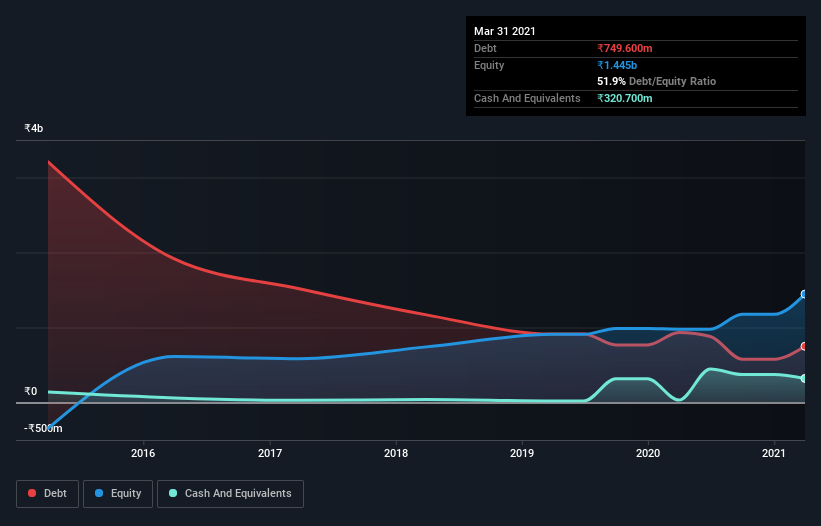Is Punjab Chemicals and Crop Protection (NSE:PUNJABCHEM) Using Too Much Debt?

Legendary fund manager Li Lu (who Charlie Munger backed) once said, 'The biggest investment risk is not the volatility of prices, but whether you will suffer a permanent loss of capital.' So it might be obvious that you need to consider debt, when you think about how risky any given stock is, because too much debt can sink a company. As with many other companies Punjab Chemicals and Crop Protection Limited (NSE:PUNJABCHEM) makes use of debt. But should shareholders be worried about its use of debt?
Why Does Debt Bring Risk?
Debt assists a business until the business has trouble paying it off, either with new capital or with free cash flow. If things get really bad, the lenders can take control of the business. However, a more usual (but still expensive) situation is where a company must dilute shareholders at a cheap share price simply to get debt under control. Of course, plenty of companies use debt to fund growth, without any negative consequences. When we think about a company's use of debt, we first look at cash and debt together.
Check out our latest analysis for Punjab Chemicals and Crop Protection
How Much Debt Does Punjab Chemicals and Crop Protection Carry?
The image below, which you can click on for greater detail, shows that Punjab Chemicals and Crop Protection had debt of ₹676.3m at the end of March 2021, a reduction from ₹933.6m over a year. However, it does have ₹320.7m in cash offsetting this, leading to net debt of about ₹355.6m.

How Strong Is Punjab Chemicals and Crop Protection's Balance Sheet?
We can see from the most recent balance sheet that Punjab Chemicals and Crop Protection had liabilities of ₹2.13b falling due within a year, and liabilities of ₹930.6m due beyond that. Offsetting these obligations, it had cash of ₹320.7m as well as receivables valued at ₹820.2m due within 12 months. So its liabilities outweigh the sum of its cash and (near-term) receivables by ₹1.92b.
Given Punjab Chemicals and Crop Protection has a market capitalization of ₹13.8b, it's hard to believe these liabilities pose much threat. But there are sufficient liabilities that we would certainly recommend shareholders continue to monitor the balance sheet, going forward.
We measure a company's debt load relative to its earnings power by looking at its net debt divided by its earnings before interest, tax, depreciation, and amortization (EBITDA) and by calculating how easily its earnings before interest and tax (EBIT) cover its interest expense (interest cover). The advantage of this approach is that we take into account both the absolute quantum of debt (with net debt to EBITDA) and the actual interest expenses associated with that debt (with its interest cover ratio).
While Punjab Chemicals and Crop Protection's low debt to EBITDA ratio of 0.37 suggests only modest use of debt, the fact that EBIT only covered the interest expense by 6.0 times last year does give us pause. So we'd recommend keeping a close eye on the impact financing costs are having on the business. Notably, Punjab Chemicals and Crop Protection's EBIT launched higher than Elon Musk, gaining a whopping 145% on last year. The balance sheet is clearly the area to focus on when you are analysing debt. But it is Punjab Chemicals and Crop Protection's earnings that will influence how the balance sheet holds up in the future. So if you're keen to discover more about its earnings, it might be worth checking out this graph of its long term earnings trend.
But our final consideration is also important, because a company cannot pay debt with paper profits; it needs cold hard cash. So the logical step is to look at the proportion of that EBIT that is matched by actual free cash flow. In the last three years, Punjab Chemicals and Crop Protection's free cash flow amounted to 37% of its EBIT, less than we'd expect. That's not great, when it comes to paying down debt.
Our View
Happily, Punjab Chemicals and Crop Protection's impressive EBIT growth rate implies it has the upper hand on its debt. But truth be told we feel its conversion of EBIT to free cash flow does undermine this impression a bit. When we consider the range of factors above, it looks like Punjab Chemicals and Crop Protection is pretty sensible with its use of debt. While that brings some risk, it can also enhance returns for shareholders. There's no doubt that we learn most about debt from the balance sheet. But ultimately, every company can contain risks that exist outside of the balance sheet. Be aware that Punjab Chemicals and Crop Protection is showing 1 warning sign in our investment analysis , you should know about...
Of course, if you're the type of investor who prefers buying stocks without the burden of debt, then don't hesitate to discover our exclusive list of net cash growth stocks, today.
If you decide to trade Punjab Chemicals and Crop Protection, use the lowest-cost* platform that is rated #1 Overall by Barron’s, Interactive Brokers. Trade stocks, options, futures, forex, bonds and funds on 135 markets, all from a single integrated account. Promoted
New: Manage All Your Stock Portfolios in One Place
We've created the ultimate portfolio companion for stock investors, and it's free.
• Connect an unlimited number of Portfolios and see your total in one currency
• Be alerted to new Warning Signs or Risks via email or mobile
• Track the Fair Value of your stocks
This article by Simply Wall St is general in nature. It does not constitute a recommendation to buy or sell any stock, and does not take account of your objectives, or your financial situation. We aim to bring you long-term focused analysis driven by fundamental data. Note that our analysis may not factor in the latest price-sensitive company announcements or qualitative material. Simply Wall St has no position in any stocks mentioned.
*Interactive Brokers Rated Lowest Cost Broker by StockBrokers.com Annual Online Review 2020
Have feedback on this article? Concerned about the content? Get in touch with us directly. Alternatively, email editorial-team (at) simplywallst.com.
About NSEI:PUNJABCHEM
Punjab Chemicals and Crop Protection
Manufactures and sells agrochemicals, specialty chemicals, bulk drugs, and related intermediates in India, Europe, Japan, Israel, the United States, Latin America, and internationally.
Excellent balance sheet with questionable track record.
Similar Companies
Market Insights
Community Narratives




